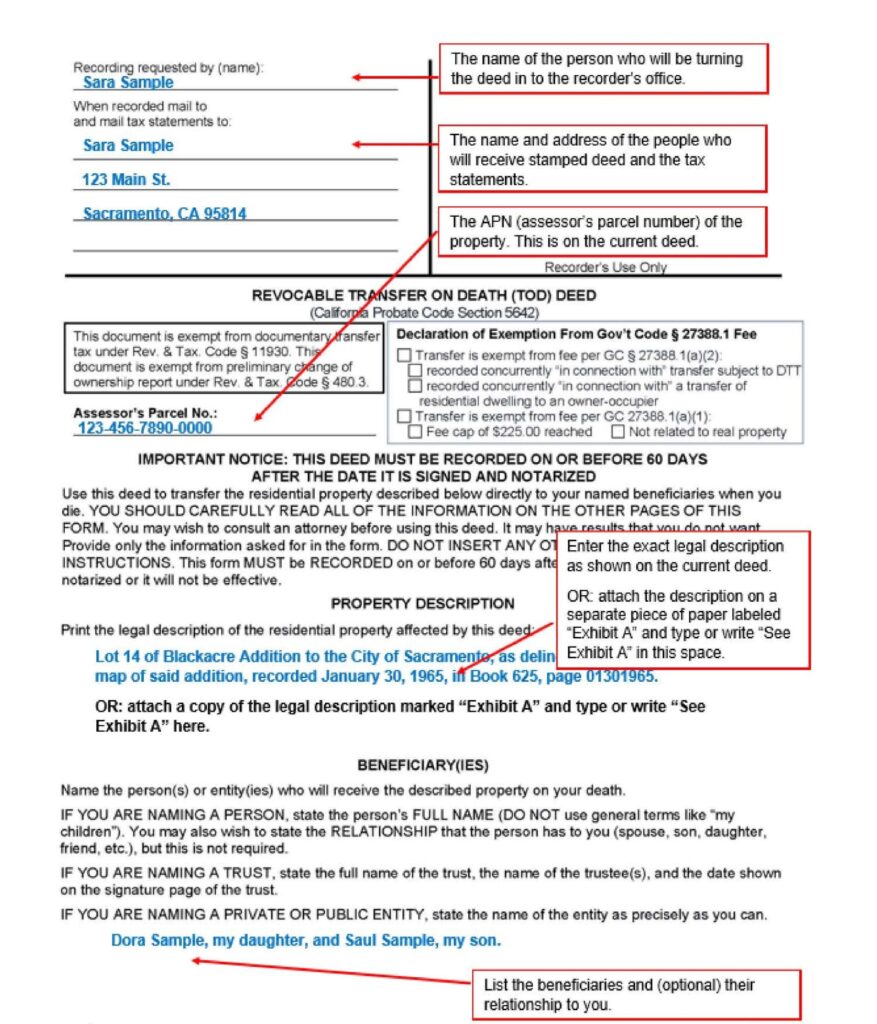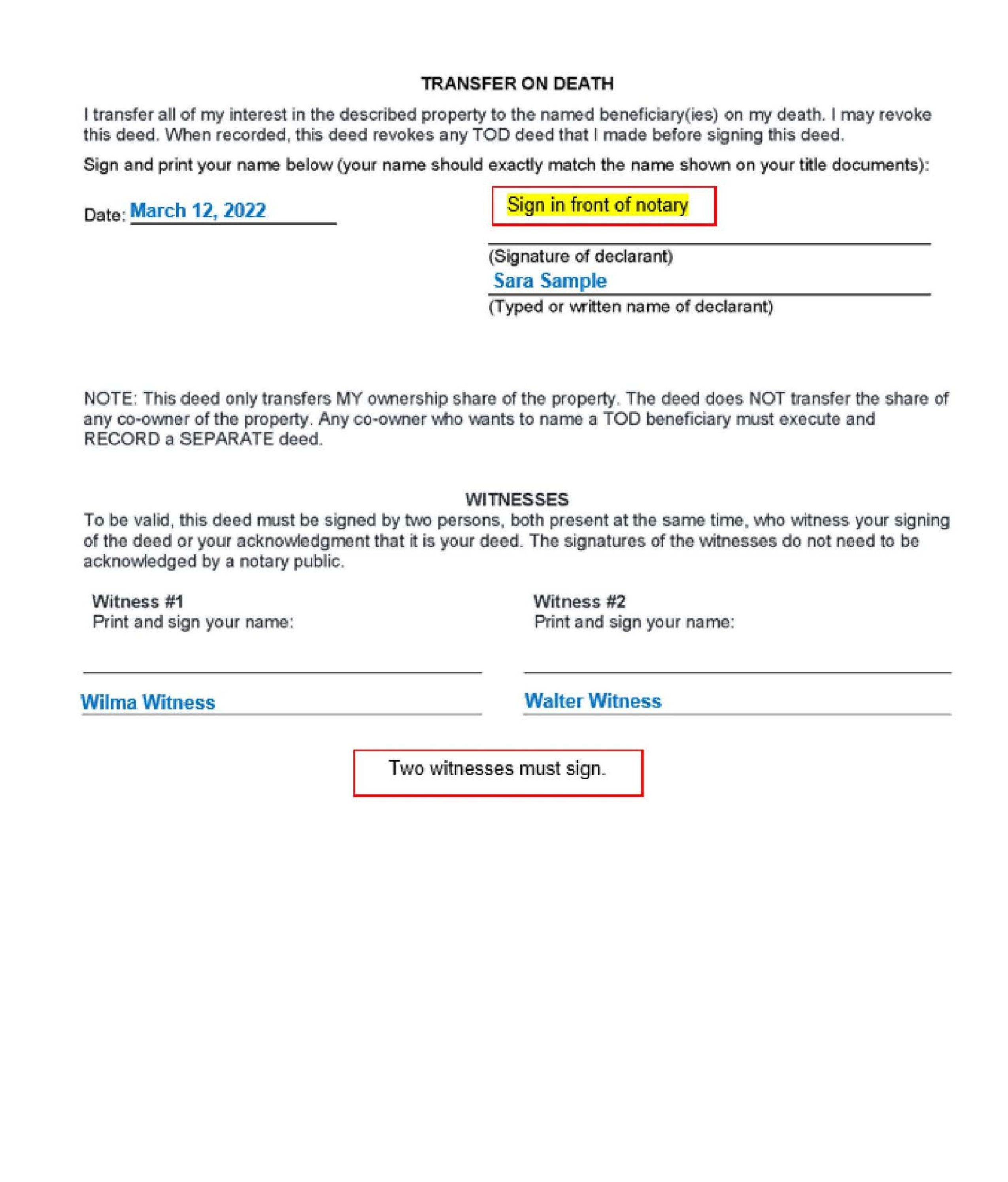

The “Revocable Transfer on Death Deed,” also called “TOD Deed” or “beneficiary deed,” is a simple way to leave a residence to your beneficiaries without the need for probate. The current owner or “transferor” names the intended heirs as “beneficiaries.” The deed has no effect until the transferor dies, so you can change your mind, refinance, or sell the property if you choose. When you die, the beneficiaries receive the property without going to court, although they do have to notify all heirs and file or record several documents.
As of Jan. 1, 2022, TOD deeds must now be signed by two witnesses, and after the donor dies, the beneficiaries must notify all heirs and file multiple papers.
Beneficiaries who are transferring real estate into their name should use our guide Transferring Title to Beneficiaries after a Transfer on Death Deed Takes Effect.
You can revoke your TOD Deed at any time, for any reason. Use our guide Revoking Transfer on Death Deeds for more information.
A TOD deed is intended to be an inexpensive way to plan who inherits your home after you die. It can only be used to transfer a property with one to four residential dwelling or condominium units, or a single-family residence with less than 40 acres of agricultural land. A mobile home may be transferred only if it is a “fixture.”
These steps help you fill out a “Revocable Transfer on Death (TOD) Deed,” which you can download from our website at the link above.
You will need information from your current deed (the deed you received when you bought or received the property) in Step 2.
If you do not have a copy of the current deed, you can purchase one from the Recorder’s Office. In Sacramento, this costs $1 per page. You can call the Sacramento office at (916) 874-6334 or visit one of the office locations (see Sacramento Clerk/Recorder website for addresses and more information).
Make sure you are looking at the deed which gives you ownership of the property. Look for a name like “Grant Deed,” “Quitclaim Deed,” “Interspousal Deed,” “Corporation Deed,” or “Transfer Deed.” Ignore any “Deed of Trust.” That is related to the mortgage on your property. It will not have all the information you need.
Before you sign the deed, you are required to read the questions and answers about how the TOD deed works. They are written in small type on page three and four contain important information you need to know prior to filling out the deed, including how to complete it; how to revoke it; its effects on taxes, Medi-Cal eligibility and reimbursement requirements; and more.
Prefer a larger version? Download a large-print version of the common questions from our website.
The TOD deed can be typed, filled out online then printed, or neatly handwritten in dark blue or black ink.
You will need the following information:
A sample completed “Revocable Transfer on Death (TOD) Deed” with more detailed instructions is available at the end of this guide.
You will need to sign the TOD deed in front of a notary. The notary will charge a fee for this service. You can find notaries at many banks, mailing services, and title companies.
Two witnesses need to sign. Their signatures do not need to be notarized. They must either witness you signing, or witness you acknowledging the form. (In other words, you must tell them, in person, what the form is and that you have signed it.)
Beneficiaries do not need to sign the TOD deed, but it is legal for them to be a witness. However, if anyone challenges the TOD deed, the court must presume that the beneficiary/witness tricked or forced you to sign, and must invalidate the deed unless the beneficiary can prove otherwise.
You must record a TOD deed within 60 days of notarizing it or it becomes invalid. This is the easiest way for TOD deeds to fail.
Record the TOD deed in the county where the property is located. The Recorder’s Office charges a recording fee and additional fees as set by state law. Current Sacramento fees are available at the County Clerk/Recorder’s website.
Senior Legal Hotline
Toll Free: (800) 222-1753; Sacramento County: (916) 551-2140
Legal Services of Northern California
Free legal assistance for Sacramento residents age 60 and over on almost any civil issue, including property transfers and deeds.
Capitol Pro Bono
916-551-2102
Free estate planning assistance for low-income residents.
California Advocates for Nursing Home Reform (CANHR)
“Transferring Your Home with a Transfer on Death Deed (TOD) – What You Need to Know”
Links several resources discussing advantages and disadvantages of TOD deeds, including a webinar for estate planning attorneys. CANHR also has a referral service to help you find attorneys specializing in elder law.
California Estate Planning (KFC 195 .A16 C3)
This book, published by CEB, discusses TOD deeds some of their tax and other implications, and possible alternatives in chapter 7.
Electronic Access: On the Law Library’s computers, using OnLaw.


This material is intended as general information only. Your case may have factors requiring different procedures or forms. The information and instructions are provided for use in the Sacramento County Superior Court. Please keep in mind that each court may have different requirements. If you need further assistance consult a lawyer.